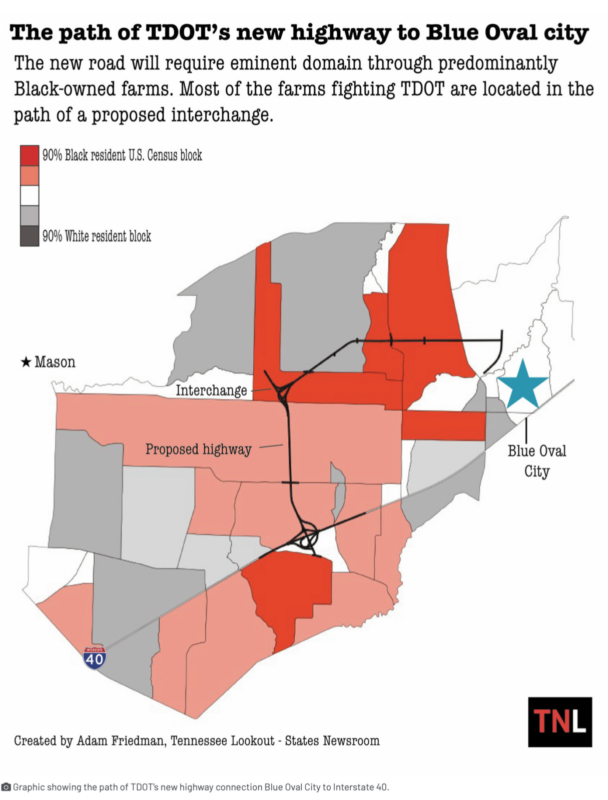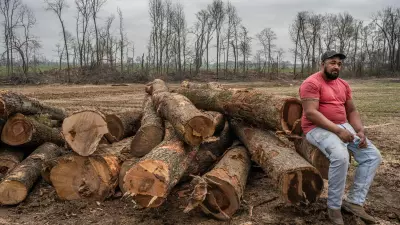The NAACP Legal Defense and Educational Fund is putting state transportation officials on notice to fairly compensate Black farmers whose property lies in the path of a roadway being constructed to benefit Ford Motor Company’s BlueOval City campus.

The organization urged the state to “take necessary steps to ensure Black residents are not disproportionately impacted by infrastructure projects related to BlueOval City, as is your obligation under Title VI,” according to a May 12 letter sent to Butch Eley, the state’s transportation commissioner.
Title VI is a federal law prohibiting discrimination from entities that accept federal funding.
“Black community members deserve to share equally in the economic opportunities generated by the new plant,” Jason Bailey, LDF Assistant Counsel, said in a statement.
“The new construction provides the state with an opportunity to do right by its farmers,” he said. “Instead, it has attempted to further dispossess them. It is time for the Tennessee Department of Transportation to provide fair compensation under the law and begin to correct course.”
The letter follows reporting by the Tennessee Lookout last month that featured Black farmers whose land lies in the path of a planned new series of road connections and widenings that will link Ford’s 4,100-acre BlueOval Ford campus to the new Exit 39 off I-40.
The 31 tracts of land the state is seeking are in predominantly Black farming communities in Haywood, Tipton and Fayette Counties. Landowners, whose property has been in families for generations, told the Lookout they were being offered far below market value for the land then taken to court when they refused to sell.
Among them was Marvin Sanderlin, a longtime local farmer with 400 acres of land who was taken to court for 10 acres of property for road construction after he declined the state’s offer of $37,500 — or $3,570 per acre, an offer he said was well-below market rates. Real estate for sale near the new BlueOval campus is on the market for much higher rates, ranging from triple the price offered Sanderlin to property abutting the plant advertised for $200,000 per acre.
Sanderlin, 72, echoed the sentiments of Black property owners who spoke to the Lookout in drawing a direct line from the state’s current efforts to take his land to the struggles in each preceding generation of his family to hold onto what they owned in the face of racial discrimination.
On Friday, a Tennessee Department of Transportation spokeswoman said state officials has already begun to respond to community concerns. The office of the Attorney General, which takes legal action to acquire properties from unwilling owners, is now asking for additional appraisals, she said.
“We are 100% confident in the process,” said Nichole Lawrence, the agency’s spokesperson. “But just to be sure the AG’s office is requesting a second opinion appraisal on all property in condemnation (except on tracts where settlement agreements have already been reached) in conjunction with TDOT. The department is working with multiple groups to help assuage any concerns.”

Those groups, she said, include the NAACP, elected leaders and faith groups. On Friday the Commercial Appeal reported the Ford Motor Company has also weighed in, issuing a statement that said:
“Ford is committed to being a good neighbor and adding to the prosperity and quality of life in every community where we do business, including in West Tennessee. We have encouraged the Tennessee Department of Transportation, which is responsible for public road maintenance and development — including eminent domain scenarios — to meet with impacted property owners and local community groups to quickly reach an equitable resolution.”
The Legal Defense Fund’s letter touched on the history of racial discrimination in the construction of the nation’s highways, noting that Black communities in Tennessee have been particularly impacted by infrastructure projects — including the construction of Interstate-40 through the longtime North Nashville Jefferson Street neighborhood. The project bisected a thriving Black community, displaced hundreds of Black families and decimated Black-owned businesses.
“The proposed highway to BlueOval City serves as another example of a transportation project that threatens to disproportionately impact Black families,” the letter said.
The letter also noted the sharp decline in the number of Black farmers in Tennessee, “due to a combination of factors including ‘violent racial animus, lynching, Jim Crowism, underhanded land dealing and intimidation,’ and a campaign of systemic discrimination by the U.S. Department of Agriculture.” By 2020, just one in every 100 farmers in Tennessee was Black; a century ago, 28 out of every Tennessee farmers was Black.
“The need to ensure Black farmers are fairly compensated is especially dire given that millions of of Black farmers have been dispossessed of their land over the last century, stripping them of their ability to accumulate wealth,” the letter said.
Anita Wadhwani is a senior reporter for the Tennessee Lookout. The Tennessee AP Broadcasters and Media (TAPME) named her Journalist of the Year in 2019 as well as giving her the Malcolm Law Award for Investigative Journalism. Wadhwani is formerly an investigative reporter with The Tennessean who focused on the impact of public policies on the people and places across Tennessee.
Now more than ever, tough and fair journalism is important. The Tennessee Lookout is your watchdog, telling the stories of politics and policy that affect the people of the Volunteer State.







